Rolling around town in a new car is an amazing feeling. The paintwork shimmers in the sun and it feels like your new ride is turning heads wherever you go.
On the other hand, buying a new car is a serious investment, and the price of a new car continues to rise every month.
If you want to maintain your car’s incredible appearance and protect your purchase, you need a ceramic car coating. These high-tech coatings will keep your car sparkling for years.
Read on to learn everything you need to know about ceramic coating in this in-depth guide to ceramic car coating.
Table of Contents
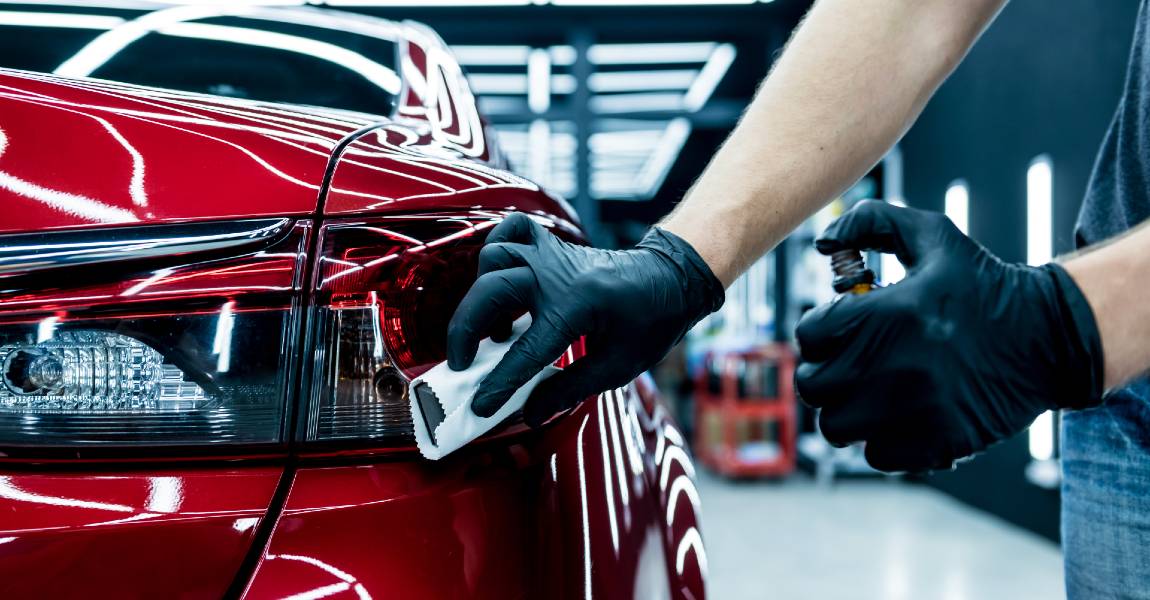
What is Ceramic Car Coating?
Ceramic coating is a substance applied directly to your vehicle’s paint job. It serves as a barrier, protecting your paint from the elements. The coating is applied as a liquid but hardens into a semi-permanent shell after the curing process.
These coatings are hydrophobic, which means they repel water. You’ll notice that water beads right off of a car with a ceramic coating.
A compound called silicon dioxide gives this coating its hydrophobic properties. It’s composed of quartz crystals, silica gel, and sand. Some coatings also use aluminum oxide, which adds even more water-repelling abilities.
This nano ceramic coating also allows a car to retain its showroom sheen. If you see an incredibly sleek-looking vehicle, there’s a good chance it’s protected by such a coating.
If the shine has worn off your car, a ceramic coating can also help restore it thanks to the titanium dioxide present in many coating solutions.
These protective coatings are superior to other car protectants like wax. They last much longer and offer more protection. This is due to the fact that coatings like these form a chemical bond to your car’s paint.
Ceramic coating for cars lasts for at least a year, but higher-end coatings applied by a professional detailer can last several years before needing to be replaced. Find out more about How Long Does Ceramic Coating Last on Cars?
The Benefits of Ceramic Coating
Ceramic coatings are a multi-purpose protective substance. You’ll reap plenty of rewards after applying one to your vehicle.
UV Ray Protection
Oxidation from the sun’s UV rays is one of the biggest issues that factory paint jobs face. Over time, UV rays break down the elements that compose car paint, leading to a dull, chalky appearance. This unsightly look can be incredibly difficult to fix.
A ceramic coating protects your car’s paint from UV rays. They won’t be able to penetrate it, so your paint won’t oxidize.
Stain Protection
Ceramic coatings also guard your car against chemical stains, which can be caused by a wide range of things and aren’t easy to remove. The most common chemical stains to find on cars come from pollution like acid rain, organic matter like tree sap and bird droppings, and winter road treatments like salt.
Due to the cured and hardened nature of this kind of coating, none of these things will be able to reach your car’s paint. You won’t have to worry about chemical stains ruining your paint job.
Easy to Keep Your Car Clean
With a ceramic coating applied to your car, keeping it clean is easier than ever. Dirt and debris won’t be able to embed themselves in your car’s paint, thanks to the slick nature of these coatings.
The process of cleaning your car will also take much less time and energy. It’s easy to rinse dirt away with water.

Glossy Appearance
Most car enthusiasts love the glossy shine of a well-detailed car, and a ceramic coating offers an easy way to get and maintain that appearance. If you want to augment your car’s paint job, there’s no better way to do so than applying one of these coatings.
Save Money in the Long Run
While some may be put off by the upfront cost of applying a ceramic coating, it’s actually one of the most cost-effective ways to maintain a car’s appearance. Since these coatings often last longer than other car protectants, such as paint protection film, you’ll likely save money if you’re someone who invests any amount of time and money in your car’s looks.
How Long Does Ceramic Coating Last?
Ceramic coating on cars can last for a long time, typically around 2-5 years, depending on various factors, such as the quality of the coating, the maintenance routine, and the environmental conditions the vehicle is exposed to.
Ceramic coating provides a strong protective layer on the car’s paintwork, which helps to prevent damage from UV rays, oxidation, and chemical contaminants. It also enhances the car’s gloss and makes it easier to clean.
Regular maintenance and proper care, such as regular washing and avoiding harsh chemicals, can help extend the lifespan of the ceramic coating and ensure its effectiveness in protecting the car’s paintwork.
How Are These Coatings Applied?
A professional detailer will help you get the most out of a ceramic coating installation. This is what you can expect.
1. Car Wash
The first step in the application process is to wash the car thoroughly. The surface must be clean, as dirt and grime can prevent the coating from properly bonding to the car.
2. Clay Bar Scrub
Once the exterior of the car is cleaned, the detailer will use a clay bar to remove other contaminants that could affect installation. The bar pulls things like bugs, tar, and chemical stains from the paint. It also helps smooth out your clear coat.
3. Paint Correction
If your car has any chips, scratches, or other abrasions, these will need to be corrected before a ceramic coating can be applied. New cars need minimal paint correction services, but older cars typically require more work.
4. Surface Prep Spray
This is the final preparation step before applying a protective coating. A surface prep spray, which contains isopropyl alcohol, will remove any traces of soap, polish, and other debris. This is incredibly important, as the detailer needs to ensure that there’s nothing between the surface of your car and the ceramic coating.
5. Applying the Coating
With the prep work out of the way, the car is ready to receive the coating. It’s applied by hand, and the detailing technician covers one area at a time before moving on to the next.
Most technicians use a sponge and a cloth to apply a ceramic coating. They’ll wipe the coating on the car from left to right and then up and down in a crosshatch pattern.
When the coating starts to “flash” or dry, they’ll buff the area with a microfiber cloth.
Most coatings need at least two layers, but the detailer will need to wait for approximately an hour before applying the next coat. If your car requires multiple coats, this step can be quite time-consuming.
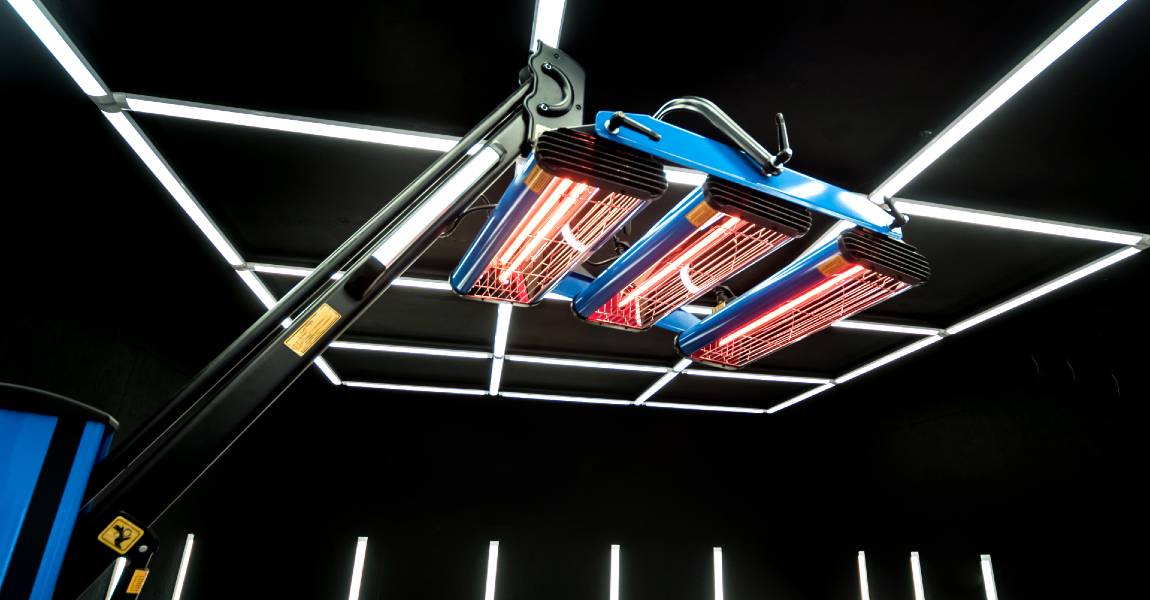
6. Infrared Curing
While it can take up to two weeks for a ceramic coating to fully bond with a vehicle’s surface, the use of infrared lamps can help shorten the process. Many shops subject a treated car to these lamps before returning it to you.
Where Can You Apply Ceramic Coating?
Ceramic coatings are a versatile paint protectant. They can be applied to a wide range of surfaces on your car.
Panels
Your car’s side panels are the most obvious candidate for a protective coating. Applying the coating to these painted surfaces is a no-brainer for preventing sun and chemical damage.
Hood
Like the panels, the hood is another obvious place to apply a ceramic coating. On the hood, you’re most concerned with the coating’s water-repelling abilities.
Windows and Windshield
Auto glass is an excellent place to apply these coatings. You won’t have to worry about rain obscuring your vision, and it makes the process of cleaning up debris like splattered bugs simple.
Headlights
Over time, oxidation can dim your headlights, but ceramic coatings can protect you from that infuriating occurrence. This is a less-obvious but ingenious use of these protective coatings.
Trim
Like your headlights, the plastic trim on your vehicle is also highly susceptible to oxidation from UV damage. Protecting it with a coating keeps it from fading.
Wheels
Car enthusiasts and detailers loathe brake dust. These deposits cling to your wheels and can be incredibly difficult to remove. Fortunately, the dust sticks to the layer of ceramic coating and can be wiped away with ease. Learn more about Applying Ceramic Coating on Wheels.
Chrome
The chrome accents on your car are always a focal point, so you’ll want to do everything you can to keep them looking their best. Exhaust pipes and step rails are the most common applications for chrome, and coatings can protect them from corrosion.
Interior
The damage from UV rays isn’t limited to your car’s exterior. Sunlight streams through your windows and can damage your dashboard, seats, and other interior surfaces.
Ceramic coating can be used to protect these areas. It’s true protection for your car, both inside and out.
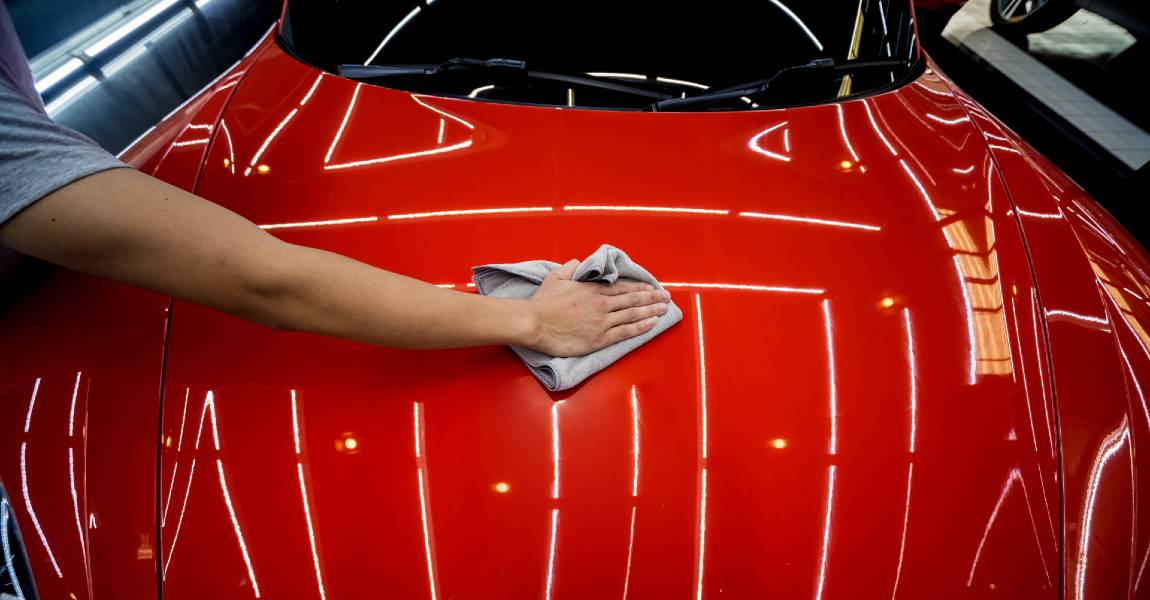
How Long Does Ceramic Coating Take to Apply?
It’ll take most detailers a few days to apply a protective coating to your vehicle. Plan to leave your car at the shop for around 48 hours.
Most of the time is spent waiting for the initial curing process. Your detailer will want to limit your car’s exposure to the elements in the hours immediately following the coating’s application.
Can You Apply Ceramic Coating by Yourself?
There are several different ceramic coating products on the market. Many of them promise the same sort of coverage one can find at a detailing shop at a much lower price.
However, those who opt for a DIY ceramic coating method will likely find themselves displeased with the level of performance offered by those products.
They are of lower quality than the kind of coatings available at a detailer. They simply won’t last as long.
You also may struggle with the installation process. Ceramic coating takes time and a significant amount of labor to apply properly. You’ll need to be sure that you spread the coating using the right technique.
If you don’t, your coating will be uneven.
Its application also needs certain environmental conditions. The area where you apply the coating needs to be around 70 degrees and free of debris. Auto shops work hard to maintain these conditions, and it might be difficult for you to replicate them at home.
For best results, visit a detailer to have your ceramic coating professionally applied. You’ll be glad you did.
How To Avoid Common Mistakes When Applying Ceramic Coatings
How to avoid common mistakes when applying ceramic coatings, make sure the surface is thoroughly cleaned and decontaminated before application, as any dirt or residue can interfere with bonding. Additionally, apply the coating in small, even sections, following the product instructions carefully to prevent streaks or uneven coverage.
How Much Does Ceramic Coating Cost?
Many people think that a professionally installed ceramic coating will cost an obscene amount of money, but the truth is these coatings are actually quite affordable. If you consider the amount of protection they offer, investing in these services is financially savvy. It would cost you more to mend the kind of damage they prevent.
If you’re looking for entry-level protection, you can find packages that start for as low as $350. On the high end, you can expect to pay around $2,000 for robust, multi-layered protection. This is an incredible value, as repainting a faded paint job is much more expensive than that.
Many shops also offer a warranty program. These can provide some peace of mind for your investment. Higher-end packages will feature a more robust warranty.
Finding Professional Ceramic Coating Services
Professional installation is the best way to get coating work, but finding a quality shop isn’t always easy. You’ll have to do your homework to find car coating services you can trust.
Look Online
You should start by looking online. A quick search should yield a number of options in your local area.
Weed out unprofessional-looking outfits. Your ceramic car coating company should have its own lot and a dedicated garage. You don’t want to trust your coating application to an amateur.

Read Reviews
The best ceramic car coating services have glowing reviews. Most customers only feel the need to leave a review if their service was either incredible or absolutely awful, so look for a detailer with several positive reviews.
You want to work with someone who exhibits professionalism and a wealth of expertise. They should be upfront about their pricing and offer a quote for free. All of this should be noted in reviews.
Browse Product Offerings
There are plenty of brands of coatings, but they vary in quality. You need to find a shop that uses high-end coatings to get the best value for your dollar.
Ceramic Pro is one of the most trusted names in nano ceramic coatings, so look for a detailer offering those products.
Do They Offer a Warranty?
The best shops will stand behind their work with a warranty. If a shop offers a lifetime warranty, you can be sure that they are proud of the service they offer.
What Can’t These Coatings Do?
The ceramic coating offers many benefits and will prove to be a good way to preserve the appearance of your car. However, this form of car paint protection has a few limitations you need to keep in mind.
Won’t Protect Against Damage
These coatings protect your car from UV rays and chemical stains, but they offer little protection against physical damage. Rocks and road debris can still mar your paint job.
It will offer marginal protection from light scratches, but it’s not a forcefield around your car that will prevent all damage. For more advanced protection, you can pair your ceramic coating with a clear bra.
Eliminate Car Washing
Some people think that a ceramic coating’s hydrophobic properties mean that they’ll never have to wash their car again. While it certainly makes the process of washing your car easier, you’ll still have to put in the work occasionally.
Totally Prevent Water Spots
Water usually beads off a car treated with a protective coating, but opportunities for water spots still exist. Some of the beaded water can remain on the car and dry in the sun if you don’t wipe it off.
Last Forever
Many of the best ceramic coatings will protect your car for years, but they’re not a permanent solution. You will eventually need to replace them. Over time, they’ll begin to wear away, leaving your car’s paint exposed.
Maintaining a Protective Coating
Your car coating will protect your car for years to come if it’s properly maintained. Follow these 5 Maintenance Tips for Cars with Ceramic Coating to protect its longevity.
Wait to Wash Your Car
While the detailer will use IR lights to speed up the curing process, your ceramic coating won’t be fully cured for at least a week or two. During this time, you should not wash your car.
If you wash your car before the coating is fully cured, you risk rinsing away the protective coating. This will ruin the work you invested in.
Your detailer should advise you on exactly how long it will take for your coating to cure.
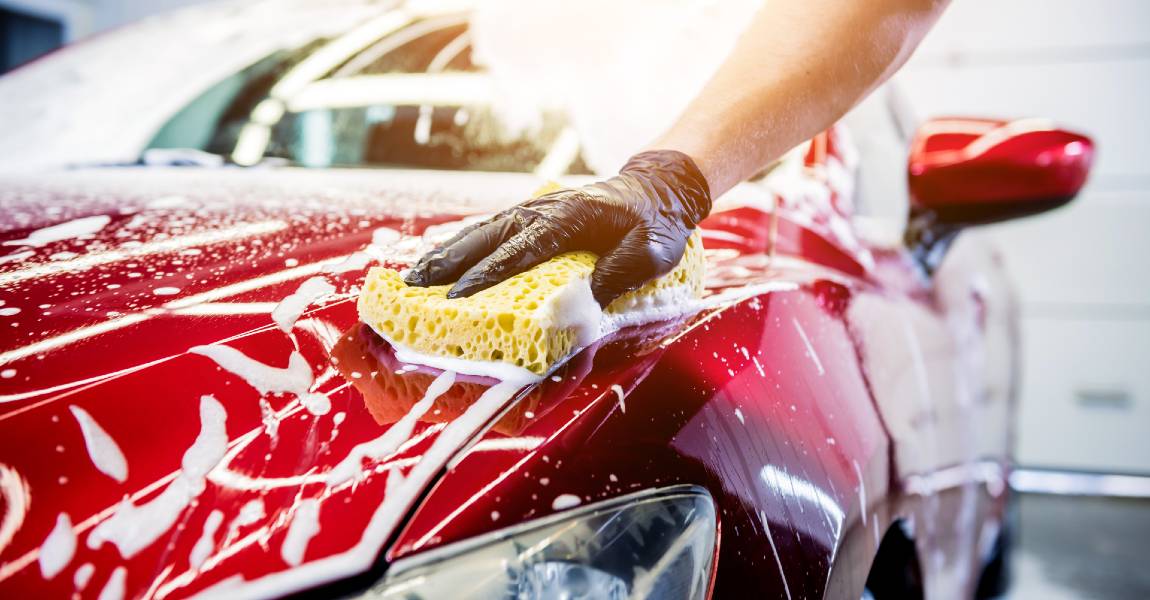
Wash Often
Once it’s bonded to your vehicle, you should wash your car regularly to ensure that you’re getting the most out of your protective coating. Dirt and debris left on a car can chip away at a ceramic coating, resulting in a reduction in its water-repelling abilities.
Use the Two-Bucket Method
This method of car washing is tried-and-true and the best way to wash a vehicle-treated with any kind of coating.
With the two-bucket method, you’ll have a wash bucket and a rinse bucket. The wash bucket is filled with soap, and the rinse bucket is filled with clean water.
You’ll dip your cloth or cleaning mitt in the wash bucket and scrub one section of the car. Before moving on to the next section, dip your mitt or rag in the rinse bucket to remove dirt. This prevents swirling and damage to your coating.
Use Automotive Soap
When you wash your ceramic-coated car, always use a dedicated automotive soap. Household cleaners contain harsh chemicals that could damage your protective coating.
Avoid Automated Car Washes
The brushes used at automated car washes can be a death sentence for a ceramic coating. The amount of force they apply can ruin your car’s protective layer. Even touch-free car washes can pose issues. The soaps they use can be highly abrasive.
Get a Maintenance Check-up
Every year, you’ll want to return to the detailing shop that applied your ceramic coating and have them perform a check-up. They’ll take a look at the coating and perform any touch-up work that needs to be done. This may even be covered by your warranty package.
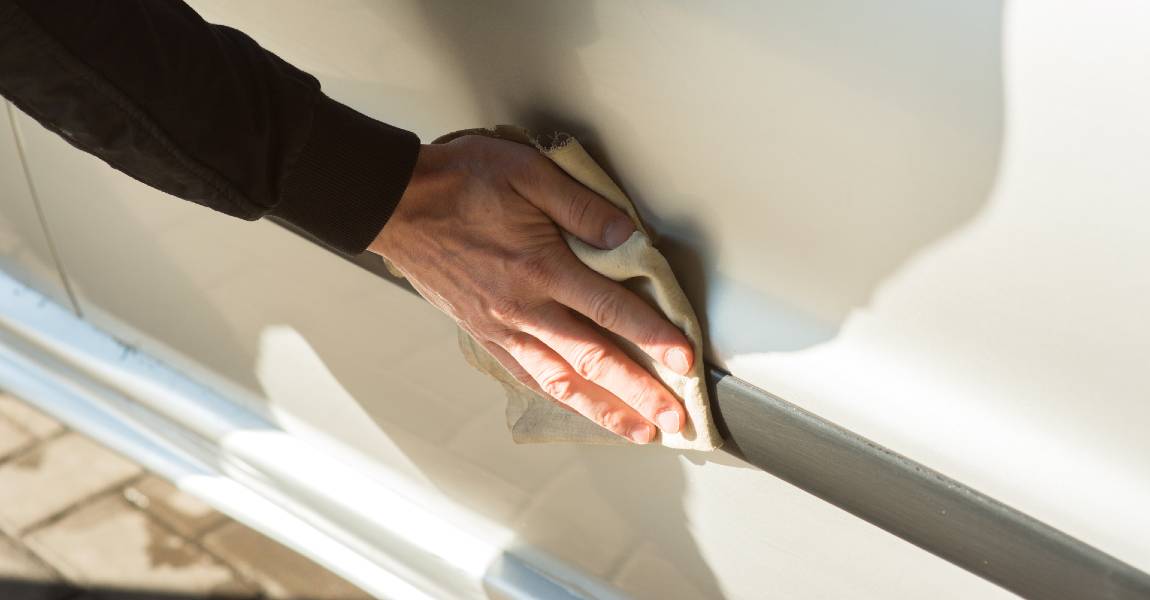
Spot-Clean to Prevent Chemical Stains
To prolong the life of your car coating, you’ll want to quickly remove any substance that could cause a chemical stain. The caustic nature of these substances can eat away at your ceramic coating, exposing your car’s paint.
Use Performance Boosting Products
A performance booster can help your coating retain its hydrophobic properties. They’ll also augment its protective abilities.
Use these once every three to four months after you wash your car. Before using a performance booster, consult with your detailer to make sure it’s a worthwhile product.
Avoid Wax
You’ll never want to put wax on top of your ceramic coating. Your coating already exhibits a beautiful shine, and wax will only hinder its ability to do its job.
Debris tends to cling to car wax, something you’re trying to avoid. It’s also less hydrophobic.
What If You Fail to Maintain Your Coating?
If you don’t take the proper steps to maintain your car coating, all the effort and money you put into it will be lost.
The first sign of a poorly maintained coating is a reduction in the gloss of the coating. As it wears away, your vehicle will begin to appear dull.
Once dulling is apparent, your coating will begin losing its water-repelling properties. You’ll notice that water doesn’t bead off the car as it did before. Water spots will be plentiful at this stage.
If you notice a significant amount of water-spotting on your ceramic coating, you can be sure that it’s lost much of its protective properties. This puts your paint at risk. You’ll need to remove the old coating and have a fresh one applied.
Ceramic Car Coating From a Trusted Name
A ceramic car coating is the best way to preserve the look of your new car. This kind of protective coating gives your car an incredible glossy sheen and keeps your paint job safe from UV rays and chemical stains. With a little bit of maintenance, this layer of protection can last for years.
For best results, you’ll want to have your coating applied by a professional.
Looking for ceramic coating in Denver? Pro-Tech Auto Shield offers top-of-the-line products, a robust warranty program, and impeccable service to all its customers. Reach out to learn about our ceramic coatings and get a quote today.





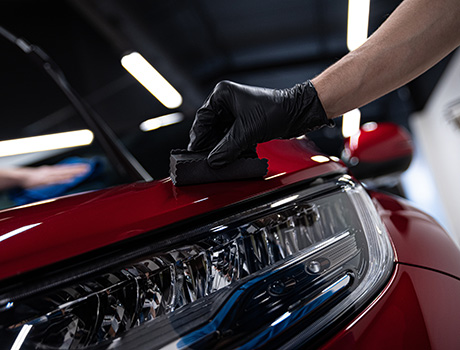
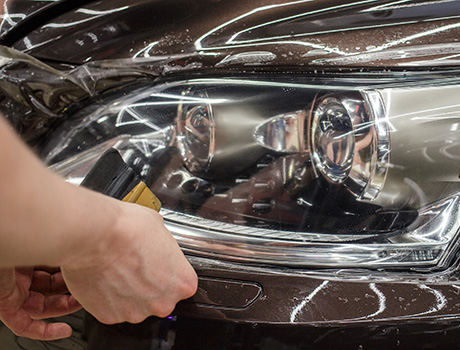

WHAT OUR CLIENTS ARE SAYING